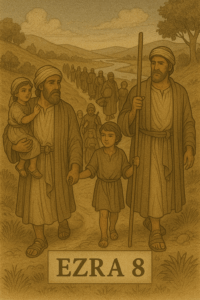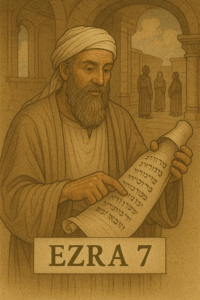The chapter begins with Elisha’s prophecy to the Shunammite woman, warning her of an impending seven-year famine. He advises her to leave her land and live elsewhere until the famine passes. The woman obeys Elisha’s counsel, demonstrating her faith and trust in God’s word. After the famine, she returns to appeal to the king for the restoration of her property. The king, intrigued by Elisha’s miracles as recounted by Gehazi, restores her land and all its produce. This narrative underscores God’s providence and the fulfillment of prophetic words, highlighting His care for His people even in times of hardship.
Elisha and Hazael: Prophetic Insight and Human Deception
Elisha’s journey to Damascus sets the stage for a significant encounter with Hazael, a servant of Ben-hadad, the king of Aram. Elisha prophesies that Hazael will become king and will bring great harm to Israel. Despite Elisha’s warning, Hazael deceives Ben-hadad by delivering a false message of recovery, only to murder him and seize the throne. This sequence of events illustrates the theme of divine foreknowledge and human agency, where God’s plans unfold through the actions of individuals, even when those actions are marked by deceit and ambition.
Jehoram and Ahaziah: The Consequences of Ungodly Alliances
The chapter shifts focus to Jehoram, king of Judah, and his son Ahaziah. Jehoram’s reign is characterized by evil practices, influenced by his marriage to a daughter of Ahab. Despite his wickedness, God’s covenant with David ensures the continuation of his lineage, underscoring the enduring nature of God’s promises. Ahaziah’s brief reign is similarly marked by idolatry and alliance with the house of Ahab, leading to his downfall. This narrative highlights the dangers of compromising with ungodly influences and the importance of faithfulness to God.
Themes and Lessons
- Divine Providence and Restoration: The story of the Shunammite woman demonstrates God’s sovereign care and provision. Her obedience to Elisha’s counsel and the subsequent restoration of her property highlight the importance of trusting in God’s word and His ability to restore what was lost.
- Prophetic Insight and Authority: Elisha’s prophecy to Hazael reveals God’s knowledge of future events and His control over political affairs. Despite Hazael’s deceit and ambition, God’s purposes prevail, illustrating the theme of divine foreknowledge and human agency.
- The Consequences of Ungodly Alliances: Jehoram and Ahaziah’s reigns serve as cautionary tales about the dangers of compromising with ungodly influences. Their evil practices and alliances with the house of Ahab lead to spiritual decline and downfall, emphasizing the importance of faithfulness to God.
- The Enduring Nature of God’s Promises: Despite the wickedness of Jehoram and Ahaziah, God’s covenant with David ensures the continuation of his lineage. This underscores the enduring nature of God’s promises and His faithfulness to His covenant commitments.
Practical Applications
- Trust in God’s Providences: Even when circumstances seem unfavorable or confusing, trust in God’s sovereign care and provision. He is always working for the good of those who love Him.
- Heed Godly Counsel: Be open to receiving and heeding godly counsel and warnings, as demonstrated by the Shunammite woman’s obedience to Elisha’s advice.
- Avoid Ungodly Alliances: Be aware of the influence of ungodly alliances and relationships in your life. Choose to align yourself with those who encourage and support your faith journey.
- Share Testimonies of God’s Work: Share testimonies of God’s work in your life to encourage others and potentially influence those in authority, as Gehazi did with the king.
Conclusion
2 Kings 8 is a rich narrative that explores themes of divine providence, prophetic insight, human agency, and the enduring nature of God’s promises. Through the stories of the Shunammite woman, Hazael, Jehoram, and Ahaziah, we gain valuable insights into God’s character and His dealings with humanity. As we navigate our own lives, may we learn from these narratives, trusting in God’s providence, heeding godly counsel, avoiding ungodly alliances, and sharing testimonies of His faithfulness.




